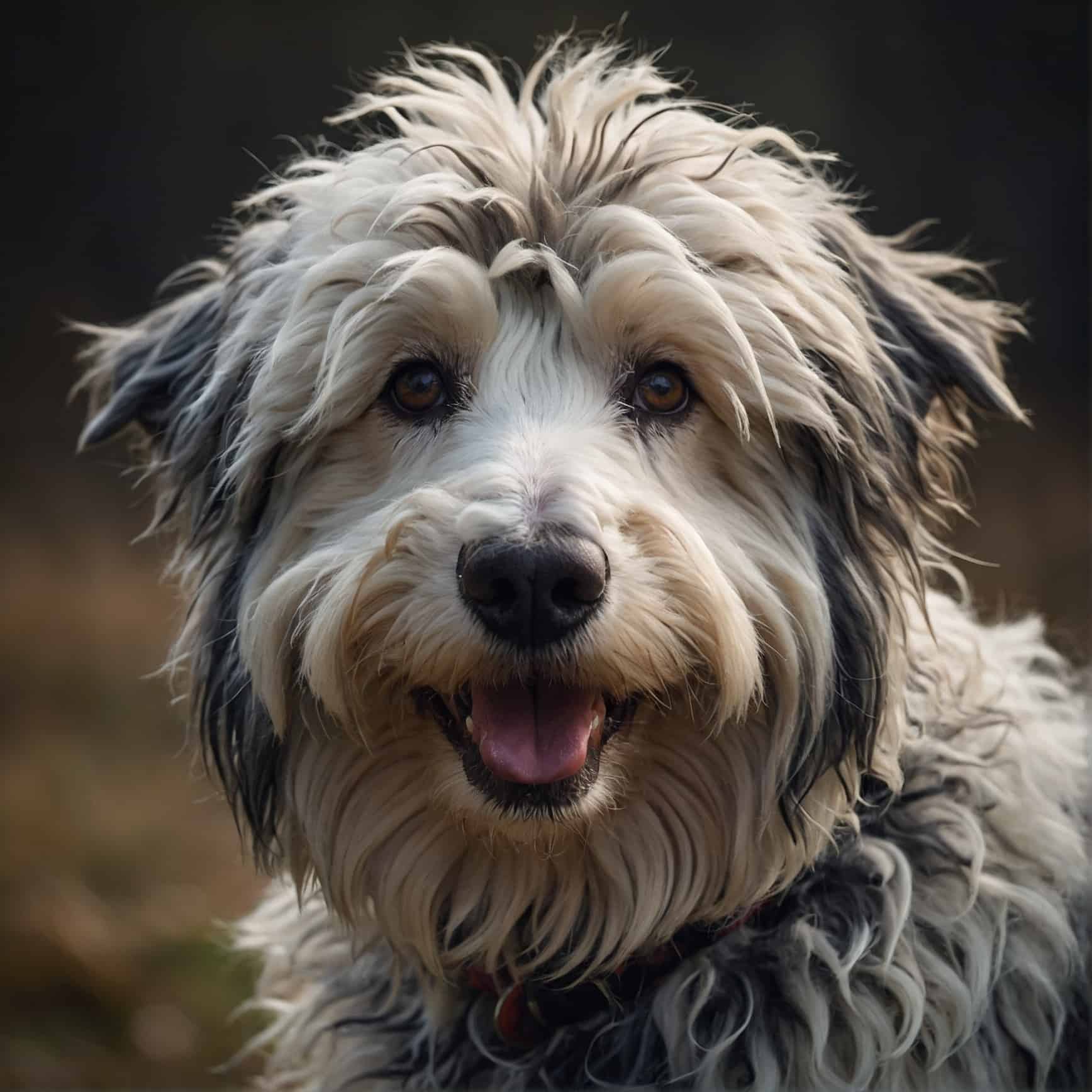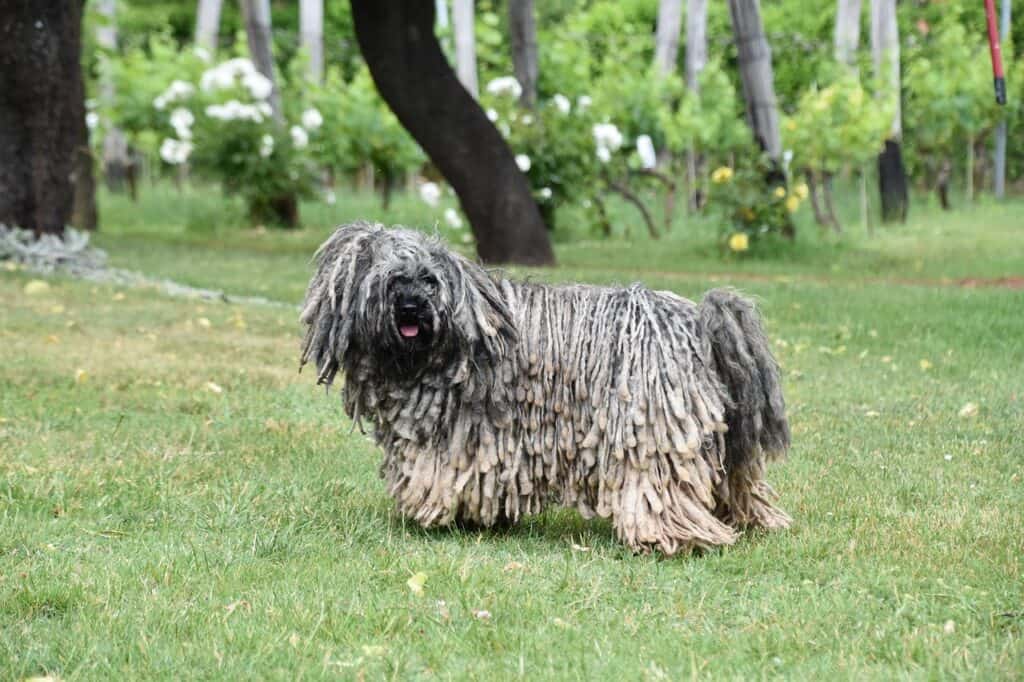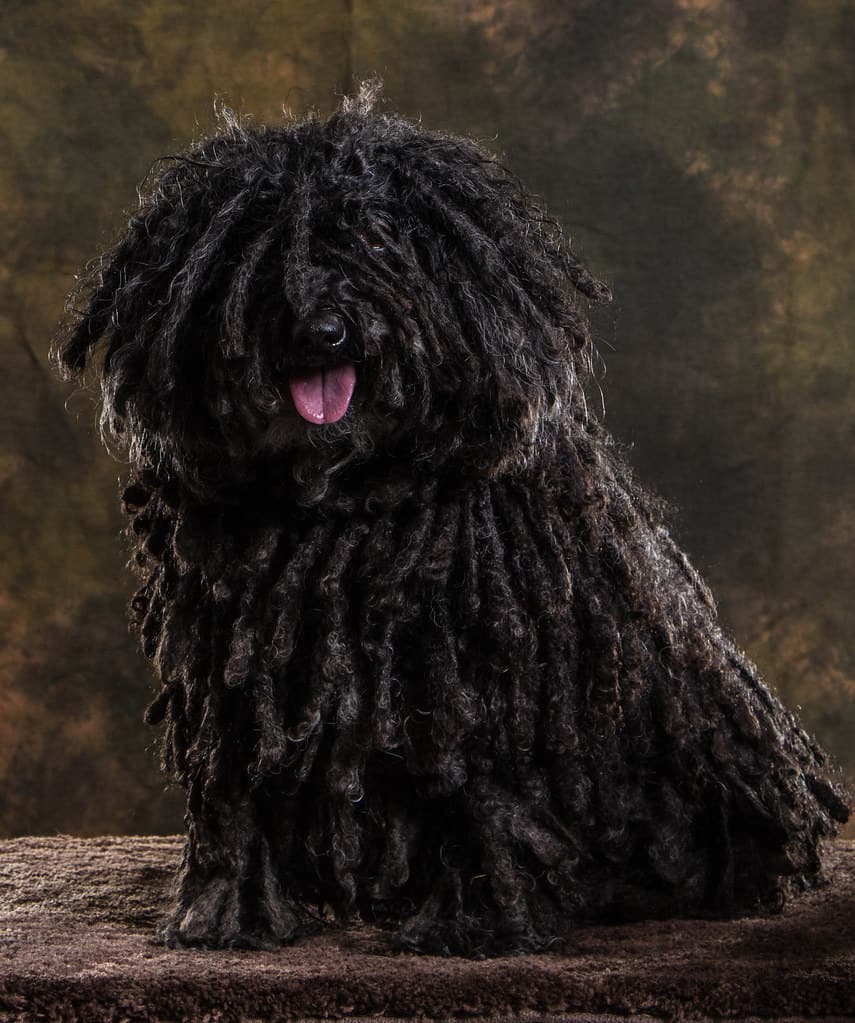The Puli, a unique and captivating breed known for its distinctive corded coat, unwavering loyalty, and intelligence, has become a beloved choice among dog enthusiasts and those seeking a one-of-a-kind companion. With Hungarian origins, its striking physical features, and a unique set of temperament traits, this breed is celebrated as an agile and endearing companion.

| Category (Explanation) | Breed Information |
|---|---|
| Year of Breed Conception | Ancient breed |
| Country of Origin | Hungary |
| Weight (lbs & kg) (Male) | 25-35 lbs (11-16 kg) |
| Weight (lbs & kg) (Female) | 20-30 lbs (9-14 kg) |
| Coat Type | Corded, long, and curly double coat |
| Color Variations | Various colors, often black, gray, or cream |
| Shedding Level (Low, Moderate, High) | Low to Moderate |
| Height (cm & in) | 16-17 inches (41-43 cm) |
| Breed Size | Small to medium |
| Trainability (Low, Moderate, High) | High |
| Mental Needs (Low, Moderate, High) | High |
| Intelligence Level (Low, Moderate, High) | High |
| Energy Level (Low, Moderate, High) | High |
| Agility (Low, Moderate, High) | High |
| Loyalty (Low, Moderate, High) | High |
| Playfulness (Low, Moderate, High) | High |
| Exercise Needs | Regular exercise and mental stimulation |
| Guarding Proficiency (Low, Moderate, High) | Low |
| Sociability with Children (Low, Moderate, High) | High |
| Barking Level (Low, Moderate, High) | Low to Moderate |
| Digging Tendency (Low, Moderate, High) | Low |
| Destructive Behavior (Low, Moderate, High) | Low |
| Drooling Level (Low, Moderate, High) | Low |
| Obedience Level (Low, Moderate, High) | High |
| Apartment Friendly (Yes/No) | Can adapt to apartment living with sufficient exercise |
| Inherent Prey Drive | Moderate |
| Physical Risk to Others (Low, Moderate, High) | Low |
| Travel Fatality Risk (Low, Moderate, High) | Low |
| Allergen Potential | Low |
| Health Concerns (List of Common Health Concerns) | Hip Dysplasia, Eye Issues |
| Average Life Expectancy (Life Expectancy in Years) | 12-16 years |
Woof Mastery is reader supported and our articles may contain affiliate links.
Instead of running third party ads that we have no control of we only use links from high-quality companies we are directly partnered with. Making use of these links come at no cost to you our reader, and in many cases have the extra benefit of discounted rates or sign up bonuses.
If you’re interested you can read more about our affiliate policy here.
We appreciate your support and always insure that the products and services we recommend are high-quality, helpful and relevant to the subject at hand!
The Puli’s history is one of distinct corded coats and herding in Hungary. These dogs were developed as herders and livestock guardians, known for their unique and corded coat.
The cords in their coat protected them from harsh weather and predators. Pulis were highly intelligent and alert herders, excelling in managing livestock.
Today, Pulis are celebrated for their distinctive appearance and herding abilities. They are known for their loyalty and their capability as working dogs.

What makes the Puli special is its unique corded coat and agile herding skills. These dogs excel in herding tasks and have an iconic appearance. Their intelligence and loyalty make them stand out as both working dogs and cherished companions.
Pulis have a long tradition as herding and working dogs in Hungary. Their unique corded coat served as protection against the elements while herding livestock. Their agility and herding instincts made them skilled at guiding and protecting animals. Today, they continue to work as herders and are cherished family pets, preserving their heritage as capable working dogs.
Pulis are known for their spirited and agile personalities. They are celebrated for their herding skills, particularly herding sheep.
Their intelligence and work ethic make them dependable herders, and they have a loving and loyal nature. Pulis are characterized by their agility, devotion, and a playful disposition, epitomizing the perfect blend of energy and affection.
Pulis are loyal and independent. They are typically good with children and other pets but may be reserved with strangers. Early socialization is important for a well-adjusted temperament.
They require mental and physical stimulation to stay content.
Pulis are small to medium-sized dogs with a unique and distinctive corded coat. They have a square-shaped head with dark, expressive eyes and floppy, v-shaped ears.
Their most notable feature is their dense, corded coat, which can come in various colors, including black, white, or gray. Their tail is often carried high and has a plume-like appearance.
Males typically stand between 16 to 17 inches (41-43 cm) at the shoulder and weigh between 25 to 35 pounds (11-16 kg), while females are slightly smaller and lighter.
Pulis have a distinctive and whimsical appearance, reflecting their role as herding and working dogs.
Pulis have a distinctive corded coat, which can come in various colors. They may not have distinct coat colors.
Pulis have a unique corded coat pattern, giving them a distinct and rugged appearance.
Pulis have a low to moderate shedding level. They shed year-round, but their unique corded coat can help trap shedding hair. Regular grooming is essential to manage their coat.
Pulis have a distinctive corded coat that requires specific grooming to maintain its appearance. Grooming habits for this breed include:
1. Mat Care: The coat naturally forms cords, which should be separated gently by hand to maintain their characteristic appearance.
2. Bathing: Bathe Pulis when necessary using a dog-specific shampoo, ensuring proper rinsing.
3. Ears: Check and clean their ears regularly to prevent wax buildup or infections with a veterinarian-recommended ear cleaning solution.
4. Nails: Keep their nails trimmed to a comfortable length to maintain proper gait and prevent discomfort.
5. Teeth: Brush their teeth regularly to ensure dental health and prevent bad breath. Dental chews or toys can be beneficial.
6. Tail and Paw Care: Maintain cleanliness in the tail and paw areas, inspecting for any signs of irritation or injury.
Pulis have a high activity level and thrive on physical and mental stimulation. Key points about their activity level include:
1. Exercise Needs: Pulis require daily exercise to maintain their well-being. Activities can include walks, playtime, and interactive tasks.
2. Energy Level: They have a high energy level, especially when young. Regular exercise helps prevent restlessness.
3. Herding Heritage: Historically, Pulis were bred for herding and guarding tasks. They excel in activities like obedience training, agility, and herding trials.
4. Mental Stimulation: In addition to physical activity, mental challenges through training and interactive games are important to keep them mentally sharp.
5. Family Companions: They make good family pets and enjoy spending time with their human companions.
Pulis are highly intelligent dogs. They are known for their problem-solving abilities, adaptability, and quick learning. Here are some key points about their intelligence:
Pulis’ intelligence makes them excellent working dogs and companions, as long as they receive proper training, socialization, and mental stimulation.
Pulis are intelligent and need mental stimulation. Engage them in obedience training and activities that challenge their minds to keep them sharp.
Social Interaction: They are social dogs and require regular interaction with their human family. Loneliness can lead to anxiety or destructive behavior, so provide companionship and attention.
Exercise: Mental exercise is equally important. Offer them tasks that challenge their problem-solving skills.
Training and Obedience: Pulis benefit from obedience training and activities that engage their minds. Consistent, positive-reinforcement training is effective in shaping their behavior.
Enter The Woof Mastery

Before welcoming a Puli into your home, consider the following:
1. Activity Level: Pulis are active dogs that require regular exercise and mental stimulation.
2. Coat Care: Their unique corded coat requires special grooming to prevent matting.
3. Space: Pulis need space to move around comfortably, making them better suited for homes with yards.
4. Herding Instinct: They may exhibit herding behaviors, so consider socialization and training.
5. Work or Activities: Pulis enjoy tasks or dog sports that engage their minds and bodies.
Pulis, known for their distinctive corded coat, may pose a physical risk to others if not properly socialized, trained, or managed. The risk assessment factors include:
1. Herding Instinct: Pulis have a strong herding instinct, which may lead to chasing or nipping at people or other animals. Proper training is essential to manage this behavior.
2. Socialization: Early and thorough socialization is crucial to ensure Pulis are comfortable around people and other animals. Poor socialization can lead to fear or aggression.
3. Training: Obedience training is essential to teach Pulis appropriate behavior and ensure they respond to commands. Well-trained dogs are less likely to engage in aggressive behavior.
4. Owner Responsibility: Responsible ownership involves being aware of the dog’s behavior and taking necessary precautions in public settings.
5. Breed-Specific Legislation (BSL): Pulis are generally not subject to BSL, but owners should be aware of local regulations.
6. Individual Variability: Each dog is unique, and behavior can vary. Responsible ownership, proper training, and socialization are key to minimizing the potential physical risk to others.
Pulis are usually good with children. They are affectionate, intelligent, and may form strong bonds with kids. Their unique corded coat can make them intriguing playmates for children.
Pulis are capable swimmers despite their unique corded coat. Their coat pattern can add buoyancy in the water. While their appearance may be distinctive in the water, their swimming ability is not hindered. Always supervise your Puli when they are near water.
Early and positive training will help your Puli puppy become a well-behaved and devoted companion.
Pulis are generally moderate in terms of noisiness. They may bark or use vocalizations when alerting their owners to potential dangers or unfamiliar situations, but they are not excessively loud.
Pulis thrive in homes that provide:
Challenges:
Traveling with Pulis involves these considerations:
Pulis are generally healthy, but they may be prone to certain health concerns, including:
Proper nutrition is essential for Pulis. Follow these nutritional habits:
Proper nutrition is essential for the health and well-being of Pulis.
Breed-specific laws (BSL) can affect Pulis in particular areas, with regulations varying depending on local jurisdictions. Common BSL restrictions that Pulis may face include:
BSL is typically motivated by concerns about public safety and perceived risks associated with specific breeds, including Pulis. However, it’s important to note that Pulis are not inherently aggressive, and BSL may affect them due to their physical resemblance to breeds that are sometimes included in these laws.
BSL is a contentious subject, and many advocates argue that it unfairly targets breeds rather than addressing individual dog behavior. They emphasize that responsible ownership, training, and education should be emphasized instead of breed-specific restrictions.
To determine if there are breed-specific laws or restrictions regarding Pulis in your area, you should check with your local animal control or government authorities. Be aware of and comply with any local regulations to ensure that you are in compliance with the law while owning a Puli.
Woof Mastery is reader supported and our articles may contain affiliate links.
Instead of running third party ads that we have no control of we only use links from high-quality companies we are directly partnered with. Making use of these links come at no cost to you our reader, and in many cases have the extra benefit of discounted rates or sign up bonuses.
If you’re interested you can read more about our affiliate policy here.
We appreciate your support and always insure that the products and services we recommend are high-quality, helpful and relevant to the subject at hand!
Myth 1: Pulis are Always Shaggy and Dirty
Truth: While Pulis have a unique corded coat, it requires regular grooming and maintenance to keep it clean and tidy. With proper care, they can have an attractive appearance.
Myth 2: They Don’t Need Exercise
Truth: Pulis are active dogs and require exercise and mental stimulation. Regular playtime and walks are important to keep them happy and healthy.
Pulis are known for their distinctive corded coat and herding abilities. While specific famous individuals may not be widely documented, they have made notable contributions in herding roles, especially in their native regions.
Pulis, with their corded coat, have been cherished by individuals who appreciate their herding abilities. Specific historical owners may not be widely recognized, but these dogs are known for their distinctive appearance and herding skills.
Pulis, like all breeds, face certain challenges and dangers. Some of the greatest dangers and concerns for the breed include:
By understanding these challenges and providing responsible ownership and care, many of these dangers can be mitigated to ensure the well-being of Pulis.
The Puli is a Hungarian herding breed with a distinctive corded coat. Its development aimed to create a dog capable of herding and protecting livestock in Hungary’s challenging terrain. Selective breeding focused on the Puli’s coat texture and working abilities.
The Puli is a breed celebrated for its distinctive corded coat and herding skills. Their agile and intelligent disposition has made them cherished working dogs and companions. Their unique appearance and affectionate nature have captured the hearts of many.
Being a Puli owner involves providing mental and physical stimulation, grooming to maintain their corded coat, and regular veterinary care. Responsible ownership includes addressing potential health concerns and nurturing their herding instincts through training.
With their corded coat and lively personality, Pulis continue to be valued for their uniqueness and dedication in both work and companionship.